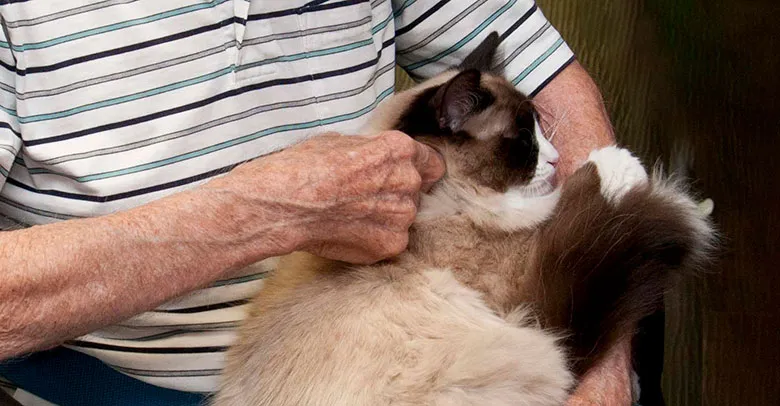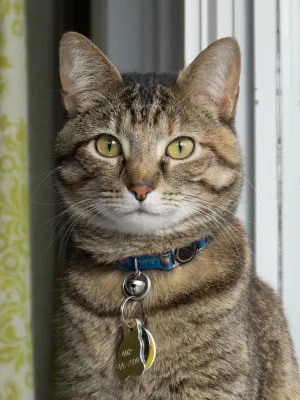
Cats are the most requested therapy animal after dogs, but make up only three percent of all therapy animals, according to Allison Hunter-Frederick of Lincoln Animal Ambassadors. The comfort provided by a therapy cat is a well-kept secret that Allison wants to let out of the bag.
Pet therapy is used to help people with health issues or mental disorders. Pet owners and their animals are evaluated and become certified to provide emotional and social support, in addition to helping achieve physical goals. Therapy cats encourage interaction and reduce anxiety as well as provide companionship and entertainment to clients.
Allison’s cat, Rainy, is a certified therapy cat and Tabitha Volunteer. Together, they bring joy to Seniors at Tabitha Nursing and Rehabilitation Center (TNRC) and Tabitha Hospice Clients. The pair work with an organization called Love on a Leash, a nonprofit that helps therapy teams get the training and certification they need to provide support in the community.

Rainy, Therapy Cat and Tabitha Hospice Volunteer
How can cats improve patients’ well-being?
• Lower blood pressure
• Reduce stress
• Decrease isolation
• Improve communication
• Develop sense of community
In addition, the vibration from a cat’s purr can slow down breathing, improve bone density and promote healing. Therapy cats can also help stimulate memories and emotions in individuals suffering from dementia and Alzheimer’s disease. Beyond the patient, cat therapy provides needed comfort and healing for family members, too.
Who can benefit from cat therapy?
• Chemotherapy patients
• Long-term care Residents
• Memory care Residents
• People in the hospital
• Veterans with post-traumatic stress disorder
• Children with upcoming procedures
• Stroke victims
• Rehabilitation therapy Clients working to regain motor skills
• People with mental health disorders & sensory disabilities
Where is cat therapy used?
• Senior living communities
• Senior centers
• Youth centers, schools and libraries
• Hospitals
• Hospice (communities or at home)
• Drop-in & group homes
• Prisons & shelters
How do therapy cats interact with Clients? Clients can:
• Watch cat play with toys or do tricks
• Feed & groom the cat
• Hold or let the cat sit on their lap
• Enjoy the animal’s comforting presence
What is the ideal therapy cat?
• Any size or breed
• One year or older
• Current on shots
• Able to wear a leash and harness
• Enjoys car rides
• Comfortable around & with dogs
• Calm & loving
Allison enjoys seeing the joy that Rainy brings to Seniors and their families at Tabitha and encourages cat owners to consider being part of a certified therapy team.
For answers to all your aging questions, start with Tabitha. Contact a Tabitha Care Expert today.